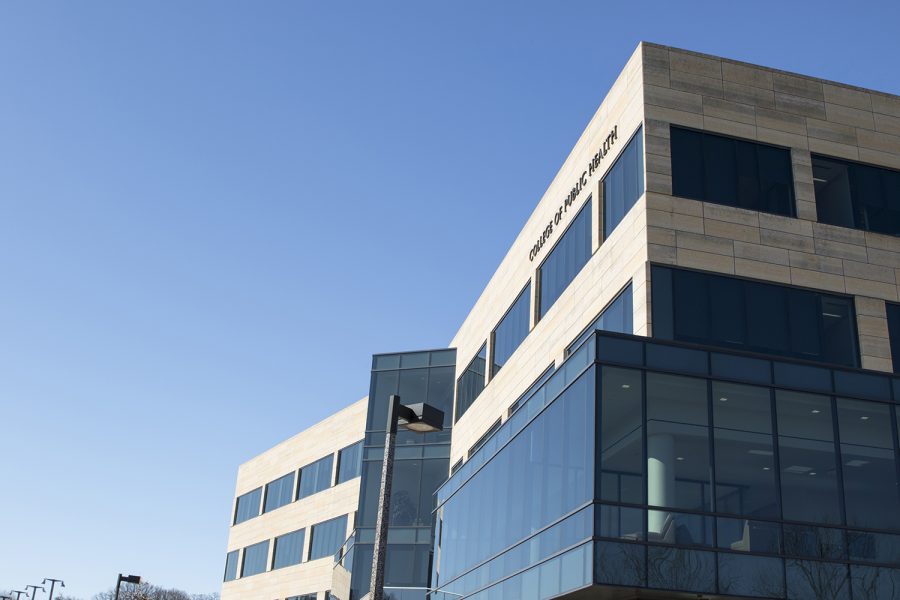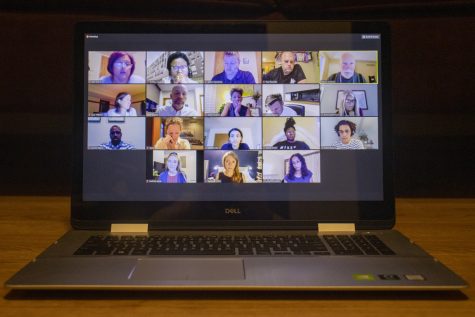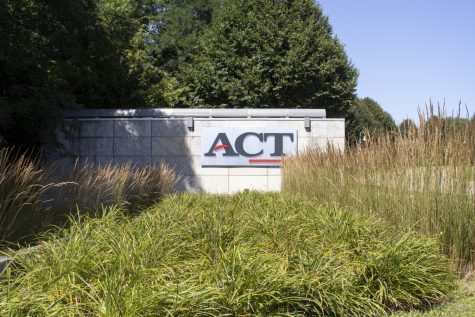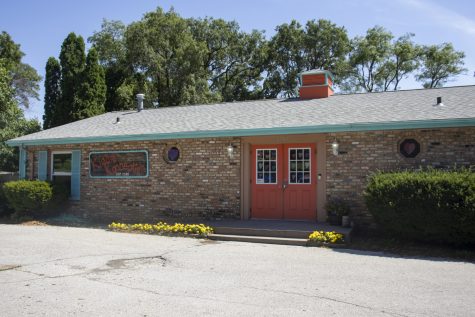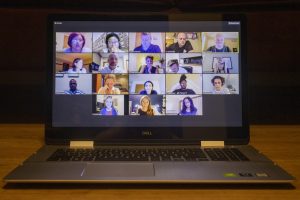Janitors and Custodians remain essential workers during COVID-19 pandemic
The sanitation and cleanliness of public buildings, schools, and businesses are left in the hands of janitorial staff and custodial workers. During a pandemic, their importance becomes even greater, but so do the risks of exposure to the coronavirus, experts say.
The College of Public Health is seen on March 11, 2019. (Katie Goodale/The Daily Iowan).
July 28, 2020
As businesses, schools, and public operations continue to open back up amid the COVID-19 pandemic, janitors and custodians are tasked with ensuring health safety through sanitation.
“The good news is that for sanitation workers, and this applies for janitors as well, generally speaking, they’re already practicing a lot of the behaviors that we would ask them to implement to protect them from infection, so for example the wearing of gloves and using disinfectant products to clean surfaces and wearing masks and maintaining as much distance and separation from raw biological fluids as possible,” said Kelly Baker, faculty member in the University of Iowa College of Public Health department of occupational and environmental health with a secondary appointment in epidemiology.
Baker, who is currently assisting with a project at the UI Health Care Centers examining COVID-19 infection risk in health care workers from janitors to doctors, said occupational guidelines for janitors and sanitation workers should already be fairly effective in protecting workers from the virus.
Baker noted, however, there are still additional steps needed to be taken by workers and employers. One example is ensuring that workers are granted flexible sick leave.
“For janitors in hospitals and schools, and office buildings, these are often the invisible front-line work force in the fight against COVID-19 transmission, but they also happen to be the lowest paid and often represent people with racial minority groups that are underrepresented in the country, and so they are particularly vulnerable to having challenges for how many days of leave they can take for being sick,” Baker said.
Baker added that janitors and custodians should be hyper aware of the infectiousness of COVID-19 in general when working — especially when it comes to touching surfaces.
As the nation continues to reopen, she said, janitors are placed at a higher risk when it comes to doing their job.
“But we have this big push to get the country back to work — we’re getting ready to have potentially 30,000 young people come back into Iowa to begin school at the university, we’ve got schools ramping up for a new school year at the end of August,” Baker said. “And so what this is going to do is it’s going to put these janitorial staff in a situation where suddenly the potential biological fluids, the respiratory droplets and things that hands are touching, there’s a lot more people now contributing to contamination on these surfaces and that increases their potential risk of exposure.”
Baker said the sheer number of things that require sanitization by custodians and janitors can be overwhelming. For example, pencils, desks, doorknobs, chalkboards, and other classroom objects are considered high touch point surfaces.
“We’re asking them to do a lot more cleaning and being a lot more diligent about how much they are cleaning but we’re also asking them to do it a lot faster, some of the back to work and back to school guidelines have rooms being cleaned … every couple of hours,” Baker said. “The employers are not increasing the number of janitorial staff that are sort of responsible for handling this.”
Baker said the possibility of people rushing their job and making mistakes as they work to keep up with the added guidelines is inevitable.
“In this big push for schools and office buildings to get back to business as usual, they need to invest in creating a safe work environment for janitorial staff which includes PPE, hazard pay, additional rest, [and] including sanitation workers in some of the planning around back to work and back to school,” Baker said.
Baker said the UI’s back-to-work plan is based upon various perspectives, including that of the environmental health and safety offices as well as people from different colleges on campus.
“I believe they have done a great job including a lot of different diverse perspectives in thinking about the risk and benefits of their back-to-school plans,” Baker said.
Andy Bruckner, associate director of UI Facilities Management Custodial Services, said in an email to The Daily Iowan that Custodial Services is focusing on critical areas and frequently used pathways and touch points while sanitizing areas.
“This fall, Custodial Services will be deploying more daytime custodians to address high touch surfaces, restocking of health stations (hand sanitizer, masks, sanitizing wipes) in buildings, and providing restroom checks to ensure a high standard of cleanliness,” Bruckner said.
Bruckner said UI Facilities management has taken a proactive approach to adapt to new circumstances set by the pandemic, which includes changing cleaning protocols, careful preparation of building systems, working with building coordinators on social distancing and health guidelines, and making sure UI employees have access to ample protective equipment.
“We are also partnering with the Registrar’s Office and Classroom Scheduling to help deliver and stock supplies for health stations (hand sanitizer, sanitizing wipes, masks) to building entrances and classrooms,” Bruckner said.
Related: UI announces alternative learning arrangements for high-risk students
Phil Decker, director of business development for Midwest Total Solutions, a cleaning and maintenance company in Hiawatha, Iowa, said the biggest shift in business has been buildings urging the disinfectant of high touch surfaces throughout the day.
“We’ll have one person cleaning, and one … disinfecting break rooms and bathrooms [and] offices literally 24 hours a day,” Decker said.
Decker said some staff members expressed nervousness and fear about working in the early days of the pandemic, but operations have become more routine as the company emphasizes safety and that people should not come to work sick.
“We think our employees … have been asked to do a lot in this,” Decker said. “I think people have always, maybe not necessarily forgot about the janitorial staff, but the people in the general offices of the building during the day don’t really see the janitorial staff so … they’re kind of like the elves that come out at night — nobody really sees them and then the place is just clean the next day.”
Decker said most janitorial staff take pride in their jobs.
“It’s not an easy time to be working in the janitorial business, but I also think they feel like they’re a part of something bigger, and they’re helping people to remain safe and be healthy,” Decker said.



